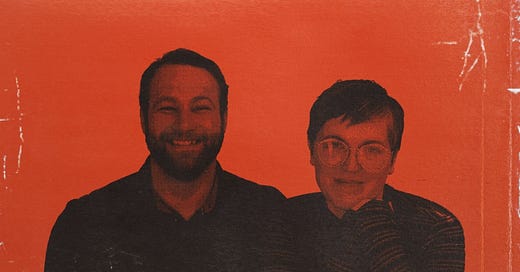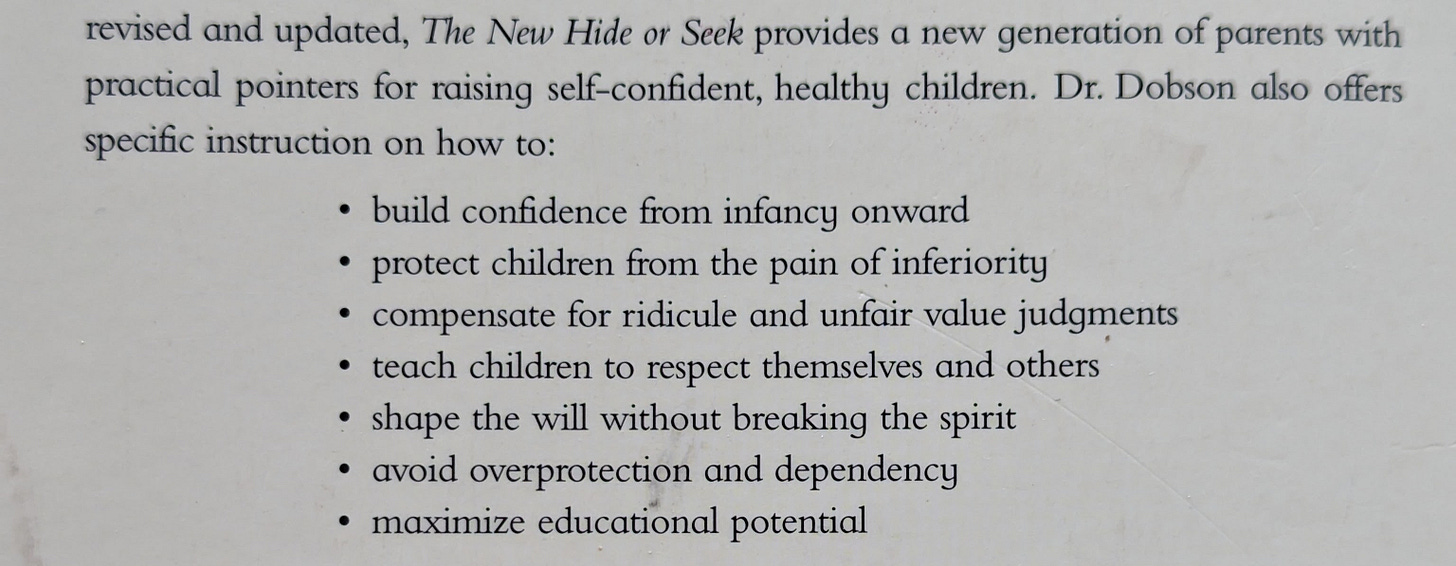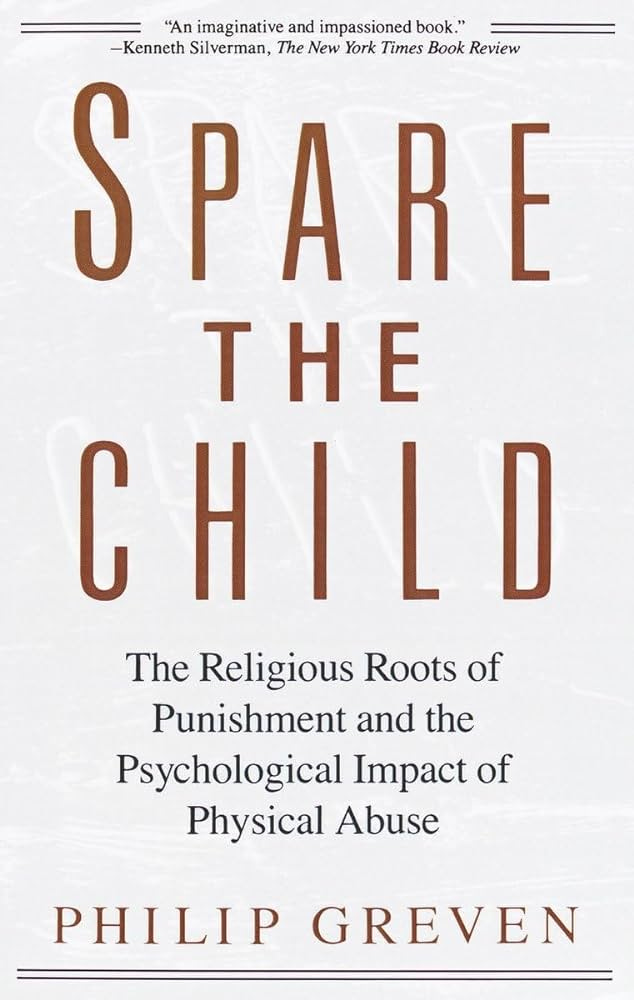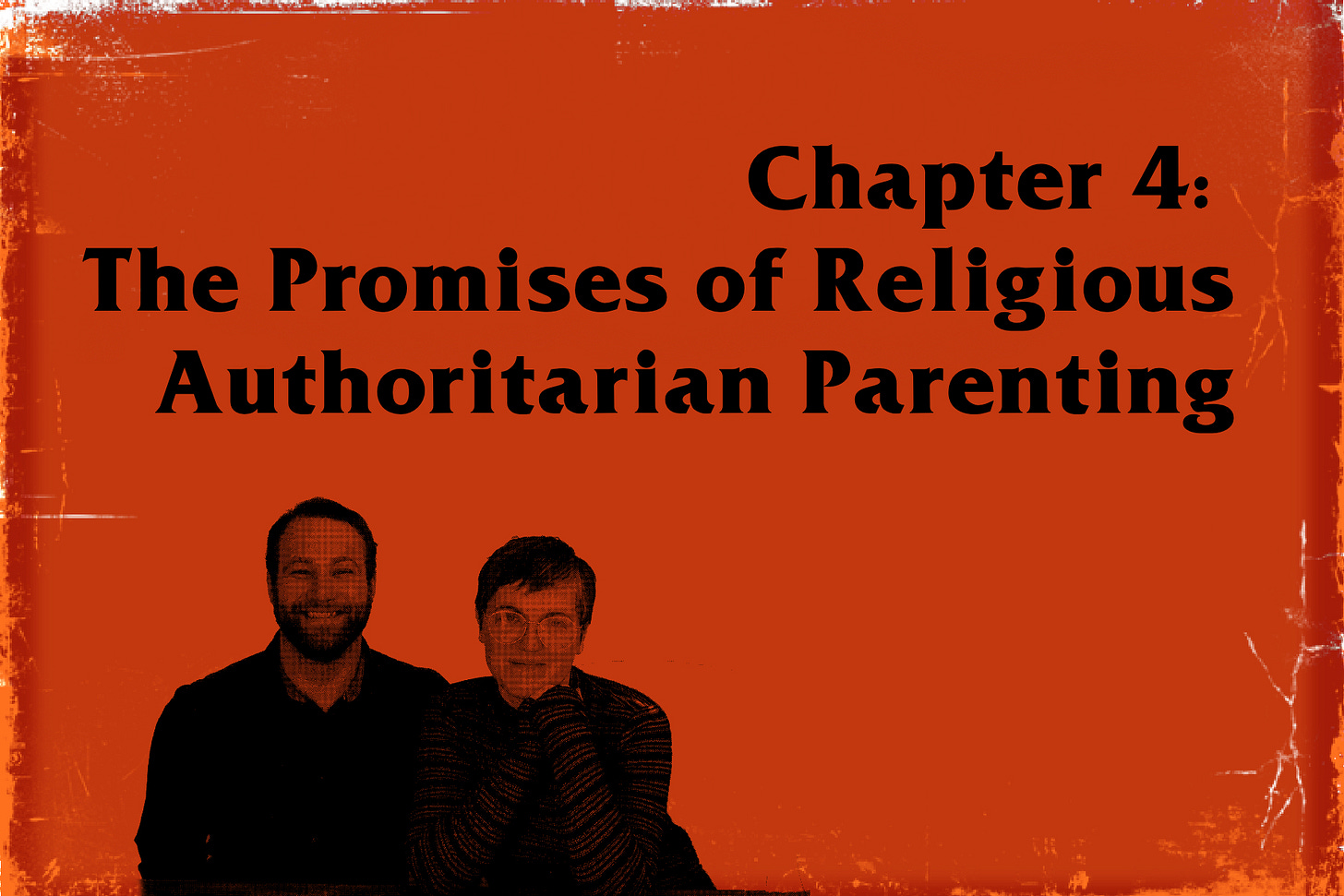Chapter 4: The Promises of Religious Authoritarian Parenting
What did Religious Authoritarian Parenting experts promise? And when do the children who grew up in such homes get to talk honestly about their experience?
STRONGWILLED is a reader-supported publication. Once a month we will be posting a chapter that is for paid subscribers only. Today’s post will give readers a chance to reflect on what RAP experts promised — and what the reality the experienced was like. We thank everyone for the support — and the 1,100 subscribers!
“This book is intended to help parents and teachers raise self-confident, healthy children.”-James Dobson, Hide or Seek1
“...that degree of order and obedience brings peace and security to the children thus trained.” -Michael and Debi Pearl, To Train Up a Child2
“Your assignment is to brand an image of your daughter as a happy, disciplined, and complete woman in your mind. Then create a swift, painful and fair discipline that successfully gets to that destination.”-Robert Wolgemuth, She Calls me Daddy3
Chapter 4: The Promises of Religious Authoritarian Parenting
Politics alone couldn’t sell parents on the religious authoritarian methods of childrearing. Authors assured parents that these methods were in the best interest of their children, selling their approach on the idea that children would feel peaceful and safe at home when they knew who the real authority was. They promised that kids would grow into emotionally healthy adults who felt confident in themselves and had a sense of emotional security. They predicted that as children left home, they would feel naturally drawn to spend time with their parents (rather than driven by fear or obligation). They taught that their authoritarian parenting methods must lead to healthy, whole, developed humans—because these methods were allegedly instituted by God.
Painting pictures of well-adjusted, emotionally secure children, authors like Dobson, the Lahayes, and others made specific claims about the healthy outcomes of their parenting methods. They promised parents that they would raise children with “self-esteem and…. a sense of direction for their lives.4” Parents were told that their children would develop self-confidence5. They claimed that using these methods would form happy6 and balanced adults and a sense of freedom7.
They assured parents of the positive outcomes for family relationships, including a close-knit family8, a relationship absent of resentment as the children became adults9, and adult children who inherently respected their parents’ views10. They painted a rosy picture of a family where children had high self-esteem and felt loved; where children grow up to be adults who feel safe and comfortable around their aging parents.

In direct opposition to these glowing promises, voices outside of white evangelicalism were warning that these parenting methods would cause psychological and social injuries. For example, as Dr. Dobson’s parenting approach was gaining popularity, there were psychologists, theologians, and child-welfare advocates who were warning parents (and society at large) that there would be a psychological cost to this type of parenting. They believed that children were being harmed and that there was a real danger of abuse occurring within these systems.
In 1990, a group in southern Minnesota drew national attention when they attempted to remove Dobson’s books from the school system due to his promotion of corporal punishment11. That same year Joyce Johnson of the Child Welfare League accused Dobson of holding an outdated approach from "20 to 30 years ago that said children were the property of their parents." Dobson also received criticism from Arthur Bodin, who at one time was the head of the Family Psychology Division of the American Psychological Association. Bodin told the Washington Post that Dobson’s approach was ineffective and could lead to rebellion and backlash12. The religious authoritarian movement even drew criticism from other Christians: Donald Capps, a professor of pastoral theology at Princeton University critiqued Dobson and other religious parenting authors, categorizing their methods as child abuse13.
Perhaps the most in-depth critique was a book titled Spare the Child by historian Philip Greven in 1990, a Rutgers professor who was fascinated with (and appalled by) the US’s history of childhood corporal punishment rooted in religious fundamentalism. He believed it wrought dire psychological circumstances for individuals in society, while also shaping our politics. He wrote “we must ask ourselves how the pain of punishment in childhood affects our innermost selves, our feelings and personalities... and about the ways in which the coercive domination so many children experience becomes the authoritarianism that pervades American life and politics14.” He specifically named James Dobson, Beverly Lahaye and Billy Graham, among others, as current-day culprits in promoting these parenting approaches, and called for a new, emotionally healthier way of parenting.
However, there wasn’t much evidence about the long-term outcomes of this type of parenting at the time. Would religious authoritarian parenting methods raise adults who were emotionally secure, happy, disciplined and grounded as promised? Would it foster a culture of mutual respect between parents and children? Would it create a family dynamic where adult children were naturally drawn to spend time with their parents? Authors like Dobson, the Lahayes, Webber and others told parents to hold out hope that they would see the good fruits of this style of parenting, as their children grew into adolescence and beyond. And only time would tell. Would the children who grew up under these methods come out as well-adjusted adults—or would they emerge with psychological scars?
Who Was Right?
Now, it’s been over half a century since Dr. James Dobson's book, Dare to Discipline, was published in 1970, sparking the religious authoritarian movement in Christian publishing. It was conjecture back then. But over half a century since parents started using these techniques, the kids who grew up in this movement are in their 30’s, 40’s, and 50’s. Now is a great time to turn to the generations who grew up under this type of parenting and ask: was it helpful or harmful?
If you’re reading this, it means you’ve subscribed to the project (thank you!), and more than likely, you have personal experience with religious authoritarian parenting. You know what it’s like to grow up in a home where these parenting techniques were used. So we’d like to take some time to reflect on the promises made by these authors.
Our hope is that the children who grew up in the midst of the religious authoritarian parenting movement will start to share their stories, and learn that they aren’t alone. We hope that as people talk about what the outcomes were for their psychological well-being, we can also honestly discuss the long-term impact on family dynamics. I (Krispin) grew up in the 1990’s, in a time when 42% of the US population identified as born again or evangelical15. Almost everyone in these circles utilized RAP parenting methods (or knew people who did). The widespread circulation of these parenting books in evangelical communities made a lasting impact on our society, and on the children who grew up under them. We believe these authoritarian parenting methods have a part to play in both the current political situation in the US, poor mental health outcomes individuals raised in these homes, and that it has increased the amount of low- and no-contact relationships of adult children with their parents16.
Utilizing authoritarian parenting methods for short-term political goals was not only short-sighted, but devastating to so many families. This grab for cultural power had consequences on both society at large and the families it influenced along the way17.
We envision STRONGWILLED as a collaborative project, an opportunity to reflect on the past decades of religious authoritarian parenting, and to hear from those who lived through it. We want to hear from you. What are the impacts on how you view yourself? How has it impacted the decisions you’ve made or your relationships? How has it impacted your ongoing relationship with your parents?
We’re excited for a continuing conversation about how these parenting practices impacted us both as kids and long-term, as adults. It’s a time for us to contemplate our experience of growing up, to speak about it, and to share our stories—not only of childhood, but the road to becoming an adult, finding our own place in the world, how we relate to our parents now, and for some of us, how we’ve come to parent our own children.
This culture war has had devastating impacts on marginalized groups, as well as those who grew up in the midst of it. Children were trained, through corporal punishment, to automatically submit to authority. This came at the cost of not developing individuality and skills to know their own needs, emotions, or perspective. It's time for all of us to share our stories about what it was like to grow up in this movement.
Let’s take these parenting promises under evaluation. Take some time to journal / reflect / talk with a trusted person about these questions if you were raised with RAP principles:
As a result of the parenting you experienced…
Do you have good self-esteem and emotional security?
Do you have self-confidence and a sense of direction in your lifes?
Are you a happy person?
Is your relationship with your parents one of mutual respect?
Is your family dynamic with your parents absent of resentment?
Do you enjoy spending time with your parents?
Do you feel respect for your parents' views?
Feel free to answer one, multiple, or all of these questions in the comments.
The comments on this post can only be seen by other paid subscribers. Please check out our commenting guidelines on this post before commenting and let’s make this a safe space for survivors to share with each other. We look forward to hearing from you!
James Dobson, Hide or Seek, 13
Michael and Debi Pearl, To Train Up a Child, 10
Robert Wolgemuth, She Calls me Daddy, 116. (yes, this is a real title of a book put out by Focus on the Family publications)
Linda Weber, Mom, You’re Incredible!, 7
Tim & Bev LaHaye, Spirit Controlled Family Living, 21
Reb Bradly, Child Training Tips, back material
Beverly Lahaye, How to Develop Your Child’s Temperament 28
James Dobson, The New Dare to Discipline, 7
Dobson, Bringing Up Boys, 219, 224.
John MacArthur, Successful Christian Parenting, 114
https://www.washingtonpost.com/archive/lifestyle/1990/08/08/the-empire-built-on-family-faith/a2b300eb-25f8-4925-af24-ce076c620f51/. Another quote from this article: “even as they criticize some of his work, psychologists admit that he's better known -- and probably richer -- than they'll ever be. "I doubt there is any American psychologist selling more books to the American public right now," said Paul Clement, a California psychologist and former professor at Fuller Theological Seminary in Pasadena.
Capps wrote an editorial titled, “Religion and Child Abuse: Perfect Together,” published in 1992, suggesting that religious authoritarian parenting methods could be torturous for kids, and paying attention to the emotional experience of children was key to healthy childrearing.
Philip Greven, Spare the Child, 122
One 2022 US study estimated 6% of adult children were estranged from their mother, 26% estranged from their father. Reczek, C., Stacey, L., & Thomeer, M. B. (2022). Parent–adult child estrangement in the United States by gender, race/ethnicity, and sexuality. Journal of Marriage and Family, 85(2), 494-517.
For example: “Focus on the Family affiliate is the unifying force behind campaign to restrict transgender rights”https://baptistnews.com/article/focus-on-the-family-affiliate-is-the-unifying-force-behind-campaign-to-restrict-transgender-rights/











I can feel how hard it is to think about some of these questions (and the taboo against answering them in a semi-public space). For me, I have a very strained relationship with my parents currently in part because they really want to "agree to disagree" about things like rights for trans people in order to have a relationship. When in childhood, of course, I was never allowed to agree to disagree.
My parents would love to have a surface-level relationship with me but unfortunately I have had access to all of their conservative political views non-stop for almost 4 decades. I understand their worldview completely and intimately, and I don't respect it at all.
Self-esteem has been such a tricky concept for me. 15 years ago, I would have told you I had great self-esteem. However, looking back I can see how it was more of a contingent self-esteem, based on achievement and external expectations or even being “better” than my peers. This led me to live a sort of “super-Christian” life where I worked in full-time ministry, went on “missions” trips to dangerous places, and studied biblical studies at a Christian university. I consistently sought out, and did, the hardest thing I could imagine doing for god (thank you, Jesus Freak mentality). This pseudo self-esteem required every ounce of my energy as a neurodivergent kid with additional learning disabilities. Eventually my body would say “no more”, and burnout would aggressively invite me into rest and undoing.
There has been a slow shift, as I have deconstructed and lost favor with conservative evangelical circles, to base my self-esteem on my values and how I align with them. In many ways, I would say I have even ditched the concept of self-esteem in favor of common humanity and self-compassion. This feels like a much sturdier base for me.
On a cognitive level, I would say I now know my value and believe all parts of me are to be met with love, compassion, and curiosity. However, the emotional learning of my “badness” still lives on, deep in my nervous system as an unwelcome guest and constant companion. I believe this learning can heal and, on somedays, I even believe it will. But I hold this hope loosely while I embrace a life-long posture gentle healing and learning.
Currently, my parents lack respect for my views and values, and I believe many of their beliefs are deeply harmful to vulnerable communities (including myself). I still want to have a relationship with them…and I don’t. I want them to change… and I see no evidence that they ever will. I want my kiddo to have relationship with them and I want to protect who he is and who he will become. Push and pull- hope and grief.